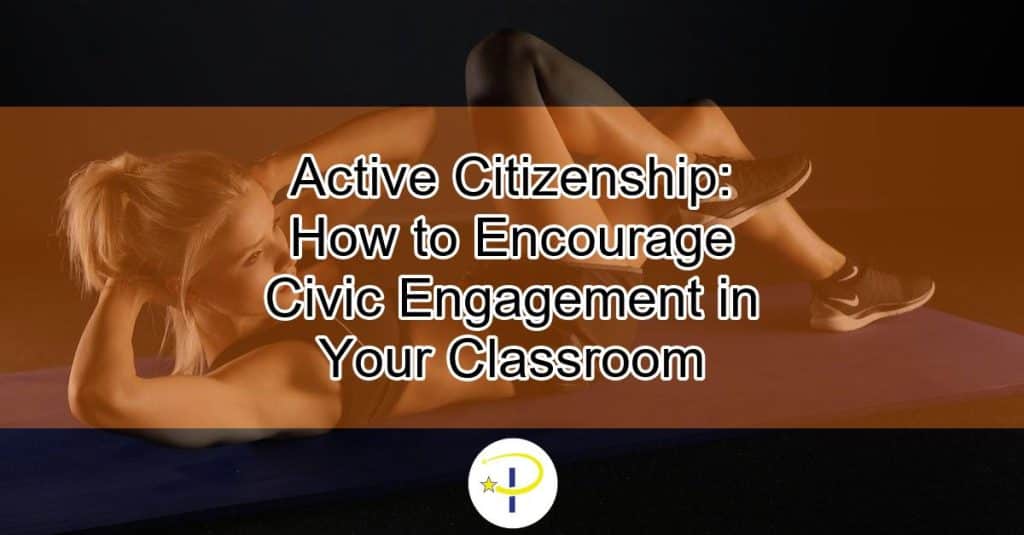Active Citizenship: How to Encourage Civic Engagement in Your Classroom
Civic engagement is a critical aspect of any functioning democracy and society. By participating in the democratic process and working towards positive change in their communities, individuals can make a real difference in the world. As educators, it is essential to instill a sense of civic responsibility and engagement in our students.
In this blog post, we will explore the importance of civic engagement and how it impacts both the classroom and society as a whole. We’ll also discuss ways to encourage civic engagement, including creating a culture of participation, incorporating real-world issues, and teaching civic responsibility. Additionally, we’ll delve into the benefits of community service and ways to engage students in service projects.
Whether you’re a seasoned educator or a new teacher just starting out, this post will provide valuable insights into how to encourage civic engagement in your classroom. Let’s get started!
The Importance of Civic Engagement
Why It Matters in the Classroom
Civic engagement is an important concept that every young student should understand and prioritize. By engaging in activities that promote civic participation, students develop crucial skills, knowledge, and values that are necessary to become model citizens.
The classroom is a perfect place to start instilling civic engagement in students. By encouraging them to take part in activities such as contributing to a newsletter, contacting local legislators, participating in workshops, and discussing activism, students can learn how to become active members of their community.
Additionally, reading opinion articles, conducting interactive presentations on democracy, social justice, and community involvement, and listening to testimonies from other students about their civic engagement experiences can also help students develop critical thinking, understanding, and active participation in their communities and the world at large.
Listed below are some practical activities that teachers can use to encourage civic engagement in the classroom:
- Encourage students to contribute to a newsletter, where they can promote literary skills and a sense of community
- Teach students how to contact their local legislators to make their voices heard
- Participate in virtual or in-person workshops to learn more about the democratic process and how to connect with legislators
- Study and discuss the activism of prominent figures such as Greta Thunberg to motivate students to become engaged and active citizens in promoting climate action
- Teach students about the six domains of global citizenship to promote empathy and understanding towards diverse cultures and societies
How It Impacts Society
Civic engagement is crucial for the growth and development of any society. When individuals become actively involved in their communities, they become valuable members who contribute to the betterment of society as a whole.
By encouraging civic engagement in the classroom, teachers can help students develop important communication, teamwork, critical thinking, and problem-solving skills that will not only aid them in their learning but also prepare them to become active and responsible members of their community.
Moreover, when young people take part in civic engagement activities, it fosters a sense of responsibility that stays with them throughout their lives. They become more informed and engaged citizens who are more likely to vote, hold public office, and become active in community organizations.
In conclusion, civic engagement is crucial in promoting a healthy and sustainable society. Teachers must prioritize civic engagement activities in the classroom to help develop responsible and engaged citizens who can contribute positively to their communities.
Ways to Encourage Civic Engagement
Creating a Culture of Participation
To create a culture of participation, teachers should provide students with the resources they need to feel empowered to make a difference in their communities. This includes developing activities that allow students to contribute to their school or local community, such as participating in a service project or political campaign. Teachers can encourage students to engage in civic activities by highlighting the benefits of active citizenship, such as gaining valuable skills and making a positive impact on society.
Another effective way to create a culture of participation is by fostering a sense of community in the classroom. This can be achieved by encouraging group projects, discussion groups, and other collaborative activities that promote teamwork and communication. When students feel connected to their peers and have a sense of belonging, they are more likely to be engaged and active citizens.
Incorporating Real-World Issues
Incorporating real-world issues into the curriculum is a great way to encourage students to be active citizens. By focusing on current events and social issues, teachers can help students understand the impact that their actions can have on the world around them. Teachers can also use this as an opportunity to teach critical thinking skills, as students learn to analyze different perspectives and develop their own opinions.
One way to incorporate real-world issues is by using technology. Teachers can use video lessons and online resources to bring current events into the classroom, making it easier for students to stay informed and engaged. Teachers can also encourage students to create their own videos, blogs, or podcasts on issues they care about, giving them a platform to share their views and ideas.
Teaching Civic Responsibility
Teaching civic responsibility is key to developing active and engaged citizens. This means educating students on their rights and responsibilities as citizens, as well as the democratic process and how they can participate in it. Teachers can also teach students about the importance of respecting diversity and promoting equality in their communities.
One way to teach civic responsibility is by using lesson plans and activities that focus on citizenship and democracy. This can include role-playing exercises, debates, and mock elections. Teachers can also use real-world examples of civic engagement, such as the work of activists like Greta Thunberg, to inspire and motivate students.
By creating a culture of participation, incorporating real-world issues, and teaching civic responsibility, teachers can encourage their students to become active and engaged citizens. By instilling the importance of citizenship in their students, teachers can help create a better future for everyone.
Engaging Students in Community Service
The Benefits of Community Service
Community service not only benefits those in need, but it also has a positive impact on students in many ways. By engaging in community service, students develop a sense of empathy and social responsibility, learn new skills, and gain valuable experiences that can be applied to their future careers. Plus, community service is an excellent way to broaden students’ horizons, introducing them to people and situations they may not encounter otherwise. It also fosters a sense of community, which can be particularly important in schools where students may not feel connected to each other.
Involving Students in Service Projects
Involving students in service projects can be a great way to engage them in their communities while also teaching important life skills. There are many ways to get students involved in community service, from volunteering at local food banks or animal shelters to organizing clean-up events in their neighborhoods. Whatever the service project, it is essential to involve students in the planning and implementation process, allowing them to take ownership of their efforts and feel more invested in the outcome. Additionally, incorporating community service into the curriculum can make it a more integral part of students’ education, providing opportunities for them to learn and grow while making a positive impact on the world around them.
As a systems identification and access expert for businesses, I understand the importance of active citizenship in our society. Encouraging civic engagement in your classroom can have a profound impact on your students and the community at large. In this article, we have discussed the importance of civic engagement, why it matters in the classroom, how it impacts society, ways to encourage civic engagement, and how to engage students in community service. If you want to learn more about this topic, be sure to check out other articles on our blog, Plus project. We’re committed to promoting active citizenship and empowering the next generation of community leaders.

We at Plus Project are passionate about transforming the adult education landscape. As a premier training provider, we take pride in offering top-notch courses for teachers, aimed at sharpening their skills and expanding their knowledge. Our expert trainers use cutting-edge methods to deliver a dynamic and engaging learning experience, making us the ideal choice for teachers seeking professional growth and success. Join us on our mission to elevate the teaching profession, one course at a time.

